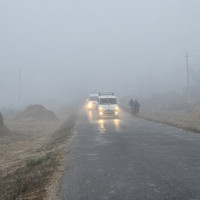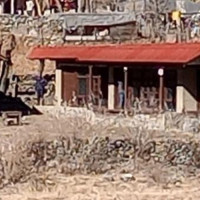- Thursday, 12 December 2024
Livestock shifted to lower regions to avoid cold
By Premraj Simkhada,Kalikot, Dec. 12: Cold has increased in Kalikot and Jumla districts after the snowfall on December 9. After a long dry spell, rainfall accompanied by snowfall in the second week of December has caused extreme cold, particularly during the daytime, compelling farmers to relocate their horses and other livestock to warmer lowlands.
Birkha Sunar of Chilkhaya in Tilagufa-9 said that due to the increased cold, they started relocating their horses and sheep to warmer regions. He said, “Our area is extremely cold. During this season, grazing is not possible, so we take livestock like horses and sheep to lower areas of the village and even to districts like Dailekh and Achham.”
In the past, it was easier to graze livestock in other districts. However, with most forest areas now registered as community forests, livestock owners face challenges in grazing their cattle.
Jeevan Shahi of Foyimahadev in Tilagufa-3 said that grazing areas have significantly been reduced in recent years because of the community forests. He said, “The snowfall makes it impossible to graze animals in our areas, and while moving them to lower regions we have to pay fees to the community forests, adding to our expenses,” he added.
During winter, livestock owners from districts such as Kalikot, Jumla, Mugu and Humla traditionally move their animals to lower, warmer regions, which do not receive snow, for grazing.
Hansa Raj Sajyal of Raskot-2 remarked that in recent years, residents of Himalayan regions have gradually stopped keeping animals like horses, sheep and cattle.
He recalled that in the past, salt was used to be transported from Humla via yaks, and marsi rice and grains used to be sent to the Himalayan areas. “We used to give rice double the salt amount we received to the traders. However, with declining manpower, as many youths now migrate abroad or engage in business, quitting their traditional occupation, agricultural lands have been left barren, causing significant declines in production,” he added.
The Bhote community from Humla is gradually migrating to urban areas and young people from Kalikot are moving abroad or to other parts of the country for employment. This has led to reduced agricultural activities in the villages.
Livestock like horses and sheep, moved to lowlands during the cold season used to be kept on barren lands, enriching the soil with manure and increasing crop yields. However, this practice is now gradually decreasing. Engineer Lilaraj Neupane, who works on climate-related issues, said that the negative impacts of climate change have resulted in warmer soil and dangerous winds, raising concerns among health experts.
Nanda Singh of Palanta Rural Municipality-9, Thirpu, also said that sudden temperature fluctuations - extreme heat during warm seasons and biting cold during winters - have adversely affected crops, including vegetables. Many locals have started moving to the Tarai region to avoid extreme weather.
















